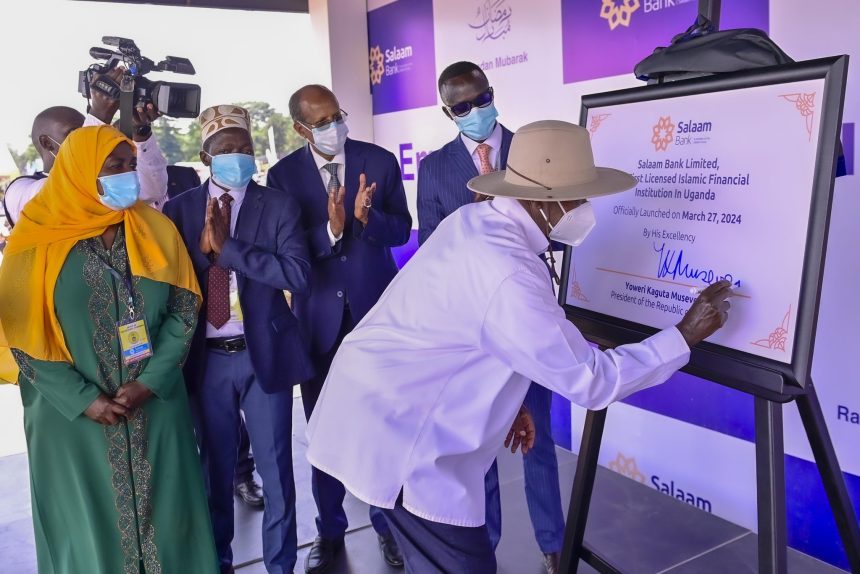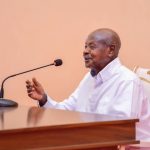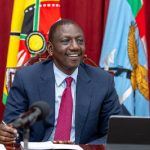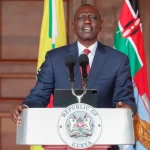President Yoweri Museveni has today March 27th, 2024 officially launched Salaam bank, the first Islamic Bank in Uganda at Kololo Independence Grounds in Kampala.
Museveni launched the Bank amidst cheers and jubilation from thousands of Muslims who gathered at Kololo Ceremonial Grounds for Duwa Prayers organized by his Kyambogo-based office under the stewardship of Hajjat Hadijah Namyalo aka Chief Muzzukulu.
Salaam Bank Uganda, a subsidiary of a Djibouti-based bank, received the license at the central bank late last year after Uganda’s parliament passed legislation to authorize Islamic banking, which president Yoweri Museveni later signed into a law.

The legislation removed the requirement to establish a “central sharia advisory council”, which the Bank of Uganda had opposed.
Read Also

President Museveni Denounces Traitors Collaborating With Foreigners & Stands Firmly By Speaker Anita Among Amid Social Media Criticism – National News Expressnationalnewsexpress.com
President Museveni Contributes UGX 200 Millions Towards Construction Of Lwengo Muslim District Headquarters & Health Center IV – National News Expressnationalnewsexpress.com
Speaking during the launch, President Museveni highlighted Islamic Banking’s potential the in the development of Uganda’s financial sector.
“I welcome you Salaam Bank to Uganda. This is a big market. The population of Uganda is 48 million now,” the President said during the national launch held at Kololo Independence Grounds on Wednesday. In the next 26 years, the population of Uganda will be 106 million, so allow more Islamic banks to come here,” President Museveni said during the launch.
“Islamic banking has the potential to make a significant contribution to the development of Uganda’s financial sector by bringing more Moslems to the money economy,” Museveni added.
However, President Museveni said he intends to meet elders of Muslims in Uganda get more clarity from them on the current government programs like the Parish Development Model contradict some Muslim principles, and if he is convinced, the government will introduce pro-Islamic programs or even have their funds go through Salaam bank.
“If you convince me that the PDM and Emyooga money has some contradictions as per the Islamic teachings, then I will find a way how I send your money direct to this bank.”
He also reiterated his call to believers to make sure that they take part in income-generating activities to improve their livelihoods.
“Where I come from in Ntungamo, we don’t entertain laziness. As a norm on that side, every person must have what he/she does like rearing animals, growing crops, fishing, manufacturing and artisanship. Therefore, when I got an opportunity to lead Uganda, I started to encourage you to fight poverty and create wealth,” he said.
“We said there are four ways through which a person can fight poverty. The first sector is commercial agriculture, then manufacturing, the third sector is services like transport, hotels, among others and finally ICT.” he emphasized
He however noted that all those avenues need capital that is why the government has been coming up with several interventions like Entandikwa, NAADS, Operation Wealth Creation, Emyooga and Parish Development Model (PDM) to enable Ugandans get the necessary start-up capital.
“These were in the form of grants, and it had nothing to do with riba (interest). The riba issue came into place recently when we launched the Parish Development Model.”
President Museveni further emphasized that National Resistance Movement(NRM), where he is the National Chairman, they don’t believe in discrimination, and they serve all Ugandans equally irrespective of their religions or tribes. He said such attribution has enabled the country to develop socially and economically.
“When Amin left, those of Lule dislodged Uganda from the Organization of Islamic Cooperation (OIC) saying that the majority of Ugandans are not Muslims but when we took overpower, we readmitted the country back to OIC. I told them that some of my people are Muslims so they must belong to such an organisation and it was also not a taboo to belong to OIC even if you are not a Muslim. We believe in politics of interest not identity,” he said.
“When the Islamic University in Uganda was beginning, some people were against it. I said no, leave it to operate. Now, it has produced so many graduates of different professions including non-Muslims. When they told me about Islamic banking, I told them I have no problem with it. I said we should let them operate and that is why we have Salaam Bank now.”
Meanwhile, President Museveni applauded Hajjat Namyalo and her team at the office of the National Chairman(ONC) for doing an incredible job of mobilizing and uniting Bazzukulu.
”Hajjat Namyalo and your team you are doing an incredible job, am very happy. Thank you for bringing together all these masses of bazzukulu,” Museveni said.
”Mr President sir, you answered the key prayer of Muslims in Uganda the day you signed a law backing Islamic Banking in Uganda, all these thousands of bazzukulu gathering here today have come to thank you and they have since joined other bazzukulu across the country to order you sir, to stand again in 2026, Omalako Jajja Sigala Ku Ballot,” Hajjat Namyalo told the President.
According to Namyalo, Salaam Bank is an answered prayer for Muslims who she said had no financial system that doesn’t contradict their religion’s principles and now with Salaam Bank and others yet to come In Uganda, there is absolutely no doubt that all Muslims will rally behind Museveni in 2026 general elections.
More About Islamic Banking
Islamic Banking is a phrase used to refer to the banking services that follow Islamic principles, which bar the charging of interest on a loan (RIBA)
Instead, it provides for the lender to take interest in the beneficiary project and at the end of it, share in the profits or losses of the project.
Apart from the reduced risk of failure to pay back, enterprises get an additional advantage of expert or technical contribution by the lender who ensures the success of the credit.
In Islamic banking, banks and their customers are considered partners who share profits or losses based on a predetermined and agreed-upon ratio.
This practice demands full disclosure or minimal information asymmetry between both parties.








